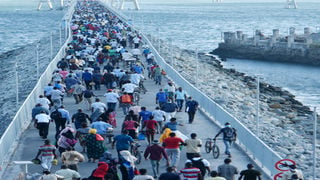
Ferry users crossing the Likioni channel at the Liwatoni Floating Bridge in Mombasa in this photo taken on 10th April 2021.
| Kevin Odit I Nation Media Group.Mombasa
Premium
The problem with Liwatoni: Agony of using floating bridge
The mandatory use of the Liwatoni floating bridge during peak hours has inconvenienced thousands of Mombasa residents, who now have to spend more on transport to get to either side of the Likoni channel.
Pedestrians interviewed by the Nation at the weekend lamented that the bridge is too far, risky and expensive at a time the economy is in a shambles.
It’s about a kilometre away and to access it, one has to either walk or board a boda-boda, which means a new transport budget.
The Mombasa County Emergency Response Committee on Covid-19 issued the directive last week in one of the measures aimed at curbing the spread of the virus.
Ms Riziki Kassim, a coconut and cassava vendor, has had a rough time using the bridge because it’s ‘too far’ and has called on the devolved unit to lift the directive.
“Instead of helping us in these tough times, the government is torturing us. Why would you force one to walk all the way with a basket of coconuts on her head? This is unfair,” said Ms Kassim.
Ferry users crossing the Likioni channel at the Liwatoni Floating Bridge in Mombasa in this photo taken on 10th April 2021.
For about a week, she has been leaving her home in Likoni at around 8am to be able to use the ferries, which only allow pedestrians after the rush hour. Between 5am – 8am and 4pm – 7.30pm, the vessels are only open to motorists.
Ms Omar Abdallah, a resident of Mt Sinai, said he spends Sh50 on a boda-boda to the bridge daily.
“When I get to the island, I spend another Sh50 to get to my place of work, which is costly. When I use the ferry across the channel, I only spend Sh30 on a matatu to the CBD,” he lamented.
Earlier plans seen by the Nation showed that the bridge was to be built near the Mama Ngina Waterfront for easy access. This was later ruled out because of risks that were raised by experts.
They included possible collision of vessels, presence of seabed cable and strong waves, which could swing the bridge.
Smooth Operations at the Lkoni ferry channel as Mombasa County begins enforcing the Likoni floating bridge usage for all pedestrians crossing the Likoni channel in a bid to control the spread of Covid-19.
As a result, they moved the site to Liwatoni, but it raised the construction cost from Sh1.5 billion to Sh1.9 billion.
When he launched the bridge on December 10 last year, President Kenyatta said it would ease movements of more than 300,000 pedestrians in and out of the island.
“The bridge is an important infrastructure project that will enable citizens of Mombasa to cross over the Likoni channel without hindrances. It will benefit the economy of the coast region,” said Kenyatta.
Thousands of commuters usually walk from home to the Likoni channel and to their places of work in town, without spending a cent. A majority do menial jobs.
“We are faced with hard times, yet they are forcing us to spend more on transport. We are already struggling to feed our families, this is not fair. The ferries are better because we don’t spend a cent,” said Martin Onyango, a Majengo Mapya resident.
The bridge was constructed following advice from the National Surveillance Systems (NSS), which had raised concerns on compliance of public health guidelines at the busy channel.
The NSS said despite commendable efforts by county coordination units and security personnel to streamline services, overcrowding at ferry approaches had been witnessed, with queues more than a kilometre long at peak hours.
Mombasa Senator Mohamed Faki (right) with his Kwale Counterpart Issa Boy at the Likoni Floating Bridge in Mombasa in this photo taken on 1st April 2021.
However, since thousands of commuters began using the bridge last week, it has been impossible to observe social distancing. There are now concerns that overcrowding could spread the virus and work against the original idea.
Two Coast senators, Mohammed Faki (Mombasa) Issa Boy (Kwale), warned that the directive could lead to further spread of Covid-19 and criticised the county government for failing to consult them before coming up with the directive.
“I strongly condemn the move by the county and national government which lacks input from the members of the public,” said Mr Faki when he toured the bridge.
He said the directive was unfair to the elderly, sick, or physically challenged who have to walk for more than a kilometre to cross to either side.
They urged officials to reconsider and have commuters use both means and instead limit the number of those using the ferry, just like it was done last year.
Commission for Human Rights and Justice executive director, Julius Ogogoh, said he will move to court to stop the county from passing directives that leave residents in difficult situations.





